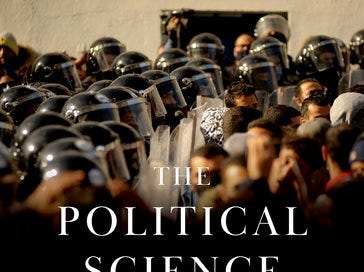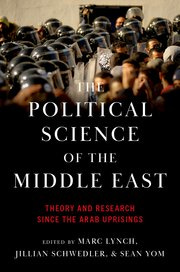Reading Middle East Political Science Through Eurasia
Alex Cooley's provocative reading of our book on Middle East Political Science
The Political Science of the Middle East, the book I edited with Jillian Schwedler and Sean Yom, came out about a year and half ago with Oxford University Press. I’ve been delighted with the response to the book, not only the published reviews but also the feedback I’ve received about it and the many positive reports of classroom use. It was a pleasant surprise to find a seventeen page review essay about the book in the new issue of Political Science Quarterly — and even more exciting to discover it had been authored by Alexander Cooley, Professor at Barnard College and for six years the Director of Columbia University's Harriman Institute for the Study of Russia, Eurasia and Eastern Europe. Given my current obsession with transregional and comparative area studies approaches, what more could I hope for than a serious reading of our comprehensive presentation of the state of the field in Middle East political science by one of the top experts in another region?
Cooley’s review essay approaches our book both on its own terms and as a way to reflect on the parallel development of post-Soviet and Eurasian Studies. He is particularly focused on the ways in which geopolitical shocks - such as the Arab uprisings or the Gaza war (in the Middle East) or the collapse of the Soviet Union and the Ukraine war (in Eurasia) — “destabilize the relationship between region-specific knowledge and the evolution of the social sciences.” Such events, he observers, “can, almost immediately, redefine the scope of what are considered relevant topics in a field; recast the status of certain disciplines, approaches, and methods; and fundamentally redefine the role of the academy within broader global communities of research, opinion making, and practice.” He is particularly struck by the discussions in several chapters, and my introduction, about how the crisis spurred methodological innovation and especially the development of new data sources and datasets - something he also observed in the Eurasian cases.
These are all excellent and provocative questions. I invited Cooley on to the Middle East Political Science Podcast to talk about them, and more - you can listen to our conversation here:
Cooley finds our discussion of the attacks on the field of Middle East political science for failing to anticipate seismic events or engage with the disciplinary mainstream strangely familiar. The attacks on the field for partisanship or bias, especially from outside academia, also have a similar ring to his ear. He also sees analytical similarities: “just as in the aftermath of the Soviet collapse, the Arab uprisings spotlighted the importance of public opinion, civil society, and street protest across a region long considered mired in political stagnation, only for authoritarian rule to adapt itself.” And, finally, he poses some profound questions about how Gaza and Ukraine have forced us to reflect on the purpose of our work as we “simultaneously pass judgment on seminal events in world affairs, serve as a site of protest and activism, and promote learning and understanding about complex issues.”
One particularly fraught issue which emerged in our conversation was the tangled politics of boycotts surrounding these conflicts. In Middle East circles, of course, there has been an intense debate over the value and morality of boycotting Israeli academic institutions (in the most recent Middle East Scholars Barometer survey, conducted a month into the Gaza war, 81% of scholars expressed at least conditional support for boycotts of Israel; in a fall 2022 survey, though, 36% said that they supported some boycotts but not an academic boycott). I had been less aware of the parallel debate about boycotting Russian nationals and institutions after the invasion of Ukraine, which seems to have been equally potent, driven by similar moral and strategic goals, and quite destructive of regional academic networks and institutions developed over the course of decades. There’s real food for thought there, and a very productive example of cross-regional comparison forcing open assumptions and confronting the consequences of such moves.
Cooley’s essay is far more than just a review of our book, though it certainly is that. It’s an invitation for cross-regional comparative thought, both analytical and political, which really got me thinking. I hope you’ll find it the same.




